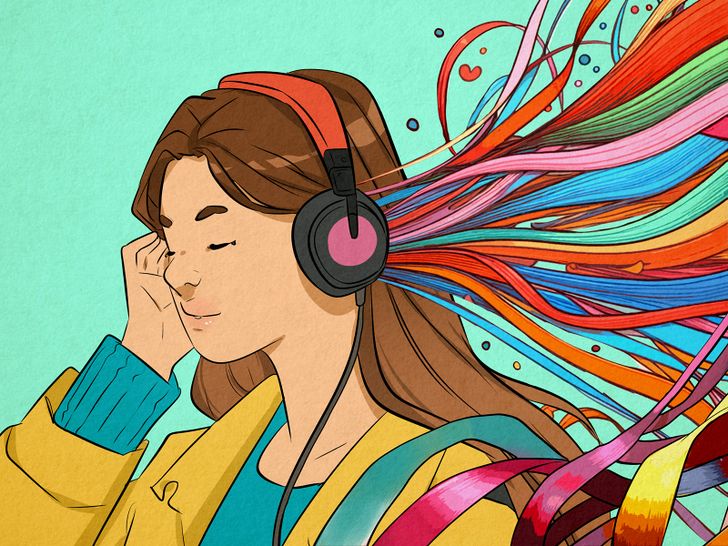What do numbers smell like? What does music look like? If these questions make sense to you, it’s possible you’ve got synesthesia—a neurological experience where one sense (like vision) leads to a second, unrelated sense (like hearing). In other words, when one sense is activated, another totally unrelated sense is activated too.
Answer these 12 questions to find out if you could be a synesthete! Just know this isn’t a formal diagnostic test—it’s only a quiz to see if you’ve got any of the characteristics of synesthesia.

Questions Overview
- Yes, I immediately think of a clear, specific personality for the number 7.
- I get certain vibes from different numbers or letters, but nothing too specific.
- No, not at all—what are you talking about?
- I’m not sure.
- Yes, it has a very distinct personality or color. (Examples: it’s friendly, or it’s red.)
- Maybe? I have some feelings I associate with Monday, but I’m not sure it has its own personality or color.
- No, definitely not. Mondays are just Mondays.
- I’m not sure.
- Yes! (Examples: February is shy and whimsical, for instance—or maybe it’s yellow.)
- I guess? It’s usually snowy, so I think of white. And Valentine’s Day is in February, so I think of it as a romantic month.
- No, not at all. It’s just a time of year.
- I don’t really know.
- Oh for sure! (Examples: A is very proper and standoffish, for instance, or perhaps it’s turquoise.)
- Possibly. I have some vague feelings about the letter “A,” I guess?
- No way. It’s just a letter!
- I don’t know.
- Oh yes. (Example: all “C” wants to do is party and have fun, but “A” is very studious and goes to bed early.)
- Maybe. I have some feelings about “A,” but not very strong feelings about “C.”
- Absolutely not. They’re just letters, people!
- I’m not sure.
- Yes, certain sounds produce specific physical sensations! (Example: Taylor Swift’s voice makes me feel tingly.)
- Sometimes, but it doesn’t always happen or it’s not very intense.
- No, I’ve never experienced this.
- I don’t know.
- Yes, they’re definitely colored in.
- Now that you mention it, some are colorful.
- No, they’re just black.
- I’m not sure.
- Yes—my own knee hurts as if I fell down myself!
- Sort of—I feel for her on an emotional level, but nothing more.
- I hope she’s OK, but personally, I feel fine.
- I don’t know.
- Almost always! It can even get distracting on occasion.
- Sometimes—it depends on what activity I’m doing.
- No, no shapes and colors for me.
- I’m not sure.
- Yes! I associate specific foods with specific words.
- Sometimes, especially if I’m hungry.
- No, that’s very strange. Words are words.
- I don’t know.
- Yeah! In my head, I see time as, like, a shape or a landscape laid out around me.
- I don’t “see” time, but I imagine a calendar in my head.
- No…I’m not even totally sure what you’re talking about.
- I don’t know.
- Yes (and boy does it make math hard!).
- No, I don’t think so. Maybe?
- No, never. Numbers are numbers.
- I’m not sure.
- I almost always experience multiple senses at once—for instance, when I listen to music, I often see colors.
- I sometimes have unusual sensory experiences.
- I don’t really ever have any unusual sensory experiences.
- I’m not sure.
- Yes, a lot of my family members get their sensory wires crossed.
- Maybe one or two, but not many.
- No, nobody in my family ever has unusual sensory experiences.
- I’m not sure.
More Quizzes
More About Synesthesia
Synesthesia is a phenomenon in which you experience multiple senses or perception abilities at the same time. It tends to run in families and people with autism, and it often occurs in visual artists or musicians. It’s thought to be somewhat rare, occurring in around 4% of people worldwide, but experts suspect more people have and just don’t realize it, since it can come in so many different forms.
Researchers estimate there may be more than 150 different types of synesthesia, including day-color synesthesia (associating days of the week with certain colors), chromesthesia (seeing colors for sounds), grapheme-color synesthesia (seeing colors when you look at letters or numbers), lexical-gustatory synesthesia (tasting words or sounds), ordinal linguistic personification (assigning personalities to letters or numbers), time-space synesthesia (visualizing time as an object or environment), auditory-tactile synesthesia (being able to “feel” sounds as physical sensations), and mirror-touch synesthesia (seeing something happen to someone else and physically feeling it).
Synesthesia is almost always totally harmless—in fact, people with synesthesia tend to have better memory recall and score higher on intelligence tests. However, it can be distracting at severe levels. Our test can’t offer you a formal diagnosis, but if you believe you have synesthesia or want to learn more about it, talk to your doctor for more info.
Want to learn more?
For more information about synesthesia, check out these resources:
You Might Also Like
Medical Disclaimer
Any medically related content, whether User Content or otherwise found on the Service, is not intended to be medical advice or instructions for medical diagnosis or treatment, and no physician-patient or psychotherapist-patient relationship is, or is intended to be, created.
Reader Success Stories
-
 "This helped me to prove to my friends that I am not crazy, that something like this exists and a lot of people are like this too. "..." more
"This helped me to prove to my friends that I am not crazy, that something like this exists and a lot of people are like this too. "..." more











